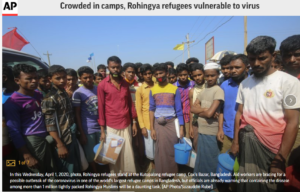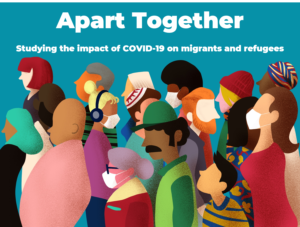Months ago I began following the dire warnings from the international humanitarian industry and its media arm about the “vulnerable” refugees living cheek by jowl in massive camps where social distancing and wearing masks is not happening.
But, surprisingly the high numbers of cases and deaths that have been predicted are not happening.
See my previous posts here, here, and here for example.

This morning I dutifully (because I promised I would continue reporting on the topic) began searching for any updates that might have happened while I was busy on other issues over the last couple of weeks, and guess what!
There is no explosion of cases, no COVID “wildfire” blowing through camps.
The only story of any interest was this one, but it mostly focuses on the fear/mistrust Bangladeshis have of the Rohingya refugees living in their country—fear that the refugees are spreading disease, which they aren’t.
I know you have more important concerns, but I think it is very strange that the predicted “carnage” has not arrived. The lack of spread raises questions about the whole concept of social distancing as a means to stop the virus.
From Nikkei Asian Review:
Rohingya scapegoated as Bangladesh battles COVID-19
DHAKA — “Two more Rohingya die from corona: Locals in panic” — screamed a recent newspaper headline in southeastern Bangladesh’s Cox’s Bazar.
Social media has sometimes been equally hysterical. One college teacher posted on Facebook that lack of awareness about COVID-19 among Rohingya refugees from Myanmar “will lead to our collapse.”
In August 2017, more than 740,000 mostly Muslim Rohingya fled a brutal military crackdown in northwestern Myanmar’s Rakhine state and entered Bangladesh as refugees. The United Nations described it as a “textbook example of ethnic cleansing.” Bangladesh already had 200,000 refugees from earlier Rohingya exoduses that began in the 1970s.
The novel coronavirus pandemic has exacerbated resentment in the densely populated country toward the refugees, and also brought further uncertainty to their chances of repatriation.
[….]
Abdul Mozid, a rural physician, runs a drug store near Kutupalong camp, a sprawling settlement made of bamboo and plastic sheets that is home to over 500,000 refugees. “Camps are like slums,” he told the Nikkei Asian Review. “People are scared that this will spread the coronavirus.”
More here, but it is mostly about the Rohingya Muslims and the fact that Burma, a Buddhist country that wants to remain Buddhist, doesn’t want them there, populating and pushing for Muslim control of the country. LOL! The article doesn’t say it, but that is what is happening.
There was this other interesting bit of new news on the issue of the Chinese virus and its impact on refugees, or lack of any great health impact so far.
 It is about a World Health Organization study where they are trying to assess the impact of COVID-19 on refugees and migrants. It is called ‘Apart Together.’
It is about a World Health Organization study where they are trying to assess the impact of COVID-19 on refugees and migrants. It is called ‘Apart Together.’
Maybe because they aren’t finding enough sick refugees, they are switching focus to find out about the “psychosocial impact of COVID-19.”
(I assume planning to use the results to badger western countries once the panic dies down.)
ApartTogether is a global study to assess the public health social impact of the COVID-19 pandemic on refugees and migrants. It is a collaboration between World Health Organization, across its regional offices, the UN System, and a consortium of research centres led by Ghent University (Belgium) and the University of Copenhagen (Denmark). The study aims to better understand how refugees and migrants experience the psychosocial impact of COVID-19 and how they deal with any challenges that have arisen.
In collaboration with key UN partners, the insights from this survey will be used to inform policy and decision-makers on how they can better support refugees and migrants during and after this pandemic. The survey runs until 31 August 2020.
